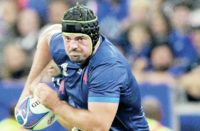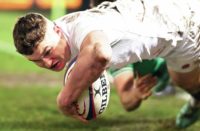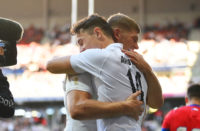 When there is enough footage of goal-kickers winning big matches to pave the M4 corridor between Twickenham and the Millennium Stadium, it seems strange that there appears to be a bad case of shrinkage when it comes to proven marksmen in the England ranks. Where Wales regularly had three Test standard goal-kickers in their match 22 last season, with Leigh Halfpenny, Rhys Priestland and James Hook keeping the scoreboard ticking over in their favour – and keeping the opposition honest within 55 metres of their own line thanks to Halfpenny's booming boot-– England look stunted by comparison.
When there is enough footage of goal-kickers winning big matches to pave the M4 corridor between Twickenham and the Millennium Stadium, it seems strange that there appears to be a bad case of shrinkage when it comes to proven marksmen in the England ranks. Where Wales regularly had three Test standard goal-kickers in their match 22 last season, with Leigh Halfpenny, Rhys Priestland and James Hook keeping the scoreboard ticking over in their favour – and keeping the opposition honest within 55 metres of their own line thanks to Halfpenny's booming boot-– England look stunted by comparison.
In the post-Wilkinson world, England's goal-kicking options are limited to the rival fly-halves, Toby Flood and Owen Farrell, while there is barely a frontline kicker in the Premiership who does not wear the No.10 jersey. London Irish are the only exception, with Tom Homer, the full-back who finished last season as the English league's top points scorer, supplanted for the moment by their new Welsh centre, Steven Shingler, as first choice kicker.
What reduces the England head coach Stuart Lancaster's options even further is that half of the goal-kicking No.10s at Premiership clubs are not English qualified. The foreign legion includes Nick Evans (NZ/Harlequins), Ignacio Mieres (Argentina/Exeter), Stephen Jones and Nick Robinson (Wales/Wasps), Stephen Donald (NZ/Bath), Gavin Henson and Gordon Ross (Wales and Scotland/London Welsh), and Nick Macleod (Wales/Sale).
That leaves a reduced pool of English marksmen for Lancaster to pick from, with Flood and George Ford (Leicester), Farrell (Saracens), Freddie Burns, Billy Twelvetrees and Tim Taylor (Gloucester), Gareth Steenson (Exeter), Stephen Myler and Ryan Lamb (Northampton), Andy Goode and Joe Carlisle (Worcester), and Danny Cipriani (Sale), currently the only regular kickers available to him. Nor has Charlie Hodgson's recent international retirement helped matters.
The shallowness of that talent pool begs this question: Why, with a ‘closed' individual skill like goal-kicking, in which practice makes perfect, do England have so few options?
Given that every player on the pitch, with the possible exception of the front row, is a potential kicker, you cannot help but conclude that conservative coaching is part of the problem. In the Premiership, and in the England set-up, there appear to be too many coaches with a follow-the-leader approach rather than an innovative mindset, where they automatically expect their fly-half to be their lead goal-kickers.

This is lazy thinking, and it has shortchanged not only England, but the Premiership clubs themselves. While I accept that as tactical linchpins and out-of-hand kickers fly-halves have a natural leaning towards goal-kicking – and often want the challenge of doing everything – there is absolutely no reason why they should have a monoply. In fact, their multiple responsibilities are often very good reasons why they should be left to concentrate on running the game, without the added pressure of being the one and only frontline kicker.
Finding top marksmen in other positions did England no harm during their double Grand Slam era in the 1990s when two full-backs, Jonathan Webb and Simon Hodgkinson, were their first-choice kickers, and Australia also broke the mould when their legendary lock John Eales started knocking them over from all angles.
The 1997 Lions provided a variation on the theme when Ian McGeechan made the series-clinching decision to get his best goal-kicker into the starting line up against the Springboks by switching Neil Jenkins, usually at fly-half for Wales, to full-back.
It is notable that Jenkins has borrowed from his own experience to pursue an enlightened policy as Wales kicking coach, spreading the duties to the back three, resulting in wing/full-back Halfpenny coming through last season's Grand Slam as one of the most accurate goal-kickers in the game.

Jenkins says: “When I was first involved with Wales we didn't have any kickers other than Stephen Jones, so we decided to progress the kicking of every back and to have as many goal-kickers as possible. Now Leigh has taken over as one of the best goal-kickers in the world. He is up there with Jonny Wilkinson in terms of hard work, and he is deservedly our No.1 kicker, and I hope he will be for some years to come. However, we also have strength in depth with Rhys Priestland, James Hook, Dan Biggar, and Tom Prydie, who is kicking from the wing for the Dragons, in our group.”
In England, by contrast, a talented goal-kicker like full-back Alex Goode struggles to get frontline practice with Hodgson and Farrell on the tee ahead of him at Saracens. As a consequence, there was an element of wishful thinking in Lancaster's suggestion at this week's England Press conference at the BMW academy near Reading, that he views the two-cap Goode as an important goal-kicking option.
Goode is as game as they come, and backs his ability, but when I spoke to him recently he outlined the difficulties he faces.
“It's going to be very tough at Saracens to be frontline, although it's not something I'm scared of. It's tough, as Charlie and Owen are great kickers, but I was very disappointed not to do it in the third Test in South Africa. I just have to keep practising and be ready when, hopefully, my chance comes. I enjoy the responsibility.”
Goode's frustration is obvious, especially in terms of inconsistencies in the Saracens rotation policy: “What I do not understand is why if you have a rotation aspect in some areas of your playing policy, you do not do the same with your goal-kickers? For instance, I was all set to do the goal-kicking in the second-half against Leicester at Wembley, but then when Owen Farrell went off, Charlie Hodgson came on.”
However, while he says it is essential to hone your technique in training, Goode's underlying message is that there is no substitute for big match experience.
“If you have kicked to Premiership level, and kicked at Wembley in big games and not missed, then you have a degree of confidence already. However, until you get those tests is very difficult to know whether your technique, mentally and physically, is up to it. For instance, silence can be intimidating for a goalkicker, and that is why a ground like Thomond Park is tough. And if you get silence combined with a last-minute cough, shout, or sledge, it can be very difficult. But in a big game you are so in your routine that you usually block it out.
“The other factor is whether you have done the groundwork. If you practice enough, and have kicked from every part of the practice pitch – and you know that it's just about you and the ball – then you know it's there when you need it. But you have to put the hours in so that you have that confidence and trust in yourself when it matters. Fears and doubts tend to set in if your preparation has not been good enough.”
Goode also hints that the focus on goal-kicking skills is not as sharp as it could be with Saracens not having a specific goal-kicking coach.
However, he says that Jon Callard, the England kicking coach, is a regular visitor. “He comes in a couple of times a month and we chat to him and ask him for advice, and it is useful especially if they can add range and distance to your repertoire. He is very keen to push me forward for England as a goal-kicker.”

Lancaster says that England are doing what is necessary to establish goal-kicking strength-in-depth, as well as develop some long-range cannons like the Springbok, Frans Steyn.
“I would trust Alex Goode as a goal-kicker. There are players beneath the senior side, and we are investing time in that – there is more going on behind the scenes than you think. One of the things is having a long range goal-kicker, that Frans Steyn type, a 55m goal kicker. Someone like Elliot Daly or Billy Twelvetrees are a pretty good example of players we have who could do it. It is something we want – you want as many goal-kickers as you can, without a doubt.”
Yet, Lancaster's observations highlight that England are playing catch-up on the goal-kicking front, trying to get their Halfpennys in a row while the young Welshman – who played in the same Junior World Championship as Goode – is already established as one of the world's best. Outside Flood and Farrell, both of whom have had a poor start to the season, the England head coach has no tried and tested back-up – and that could leave him going to players he might otherwise not select as his starting fly-half, purely for their goal-kicking.
Goode is a promising kicking option, but one without regular form at Premiership level, and while Gloucester's Burns has been impressive in improving his success rate from 60 per cent last season to 80 per cent this, his big match temperament is an unknown. Inside centre Twelvetrees and outside centre Daly are works in progress, but neither are currently Test standard kickers, and, like Burns, are unlikely to be in Lancaster's starting 22 this autumn.
During the Woodward era even the peerless Wilkinson was not left out on a limb, with Mike Catt and Matt Dawson as accomplished understudies. Given Danny Care's footballing background, there is no reason why he and Goode cannot do the same job now, as long as they can get some Premiership practice.
The trick for Lancaster is to ensure that over the course of this season he manages to raise England's goal-kicking game to something approaching the three-tier template of the Welsh Grand Slammers, or the England of 2003, because at the moment a lack of class marksmen is in danger of leaving him badly exposed.

























